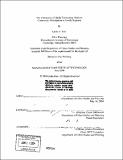| dc.contributor.advisor | Ceasar McDowell. | en_US |
| dc.contributor.author | Kim, Linda A. (Linda Anne), 1981- | en_US |
| dc.contributor.other | Massachusetts Institute of Technology. Dept. of Urban Studies and Planning. | en_US |
| dc.date.accessioned | 2005-06-02T18:18:32Z | |
| dc.date.available | 2005-06-02T18:18:32Z | |
| dc.date.copyright | 2004 | en_US |
| dc.date.issued | 2004 | en_US |
| dc.identifier.uri | http://hdl.handle.net/1721.1/17700 | |
| dc.description | Thesis (M.C.P.)--Massachusetts Institute of Technology, Dept. of Urban Studies and Planning, 2004. | en_US |
| dc.description | Includes bibliographical references (p. 87-88). | en_US |
| dc.description.abstract | Media is an important part of the political process, and alternative media is especially valuable for community organizing. Youth media programs can play a great role in the development of media technology as a community-building tool. This study proposes that a key way to bring youth into community mobilization efforts is through their interest in media and their deftness in learning how to use media tools. The combination of youth and media is powerful for communities and warrants discussion and development. This study begins the discussion first with an examination of media forms as a tool for grassroots movements. The potential of digital media is particularly emphasized. Secondly, a survey of youth media programs in the United States identifies ways that youth are already being served and provides the background for understanding how youth media programs equip young social activists in their local communities. Finally, case studies of two youth media programs investigate how, or if, the development of technical and creative skills around media translates to social and political mobilization, especially among youth. The use of media to bring youth into community mobilizing and to strengthen their efforts is promoted. The role of youth media programs in making this possible is put forth. This discussion of translating media technology skills to community action is significant, as it points to new directions in community organizing. As technology becomes more advanced and accessible to communities, digital media tools are increasingly significant in society and for groups who want to change society. The future of community development is closely connected to media and computer technology. | en_US |
| dc.description.statementofresponsibility | by Linda A. Kim. | en_US |
| dc.format.extent | 101 p. | en_US |
| dc.format.extent | 4724928 bytes | |
| dc.format.extent | 4724737 bytes | |
| dc.format.mimetype | application/pdf | |
| dc.format.mimetype | application/pdf | |
| dc.language.iso | eng | en_US |
| dc.publisher | Massachusetts Institute of Technology | en_US |
| dc.rights | M.I.T. theses are protected by copyright. They may be viewed from this source for any purpose, but reproduction or distribution in any format is prohibited without written permission. See provided URL for inquiries about permission. | en_US |
| dc.rights.uri | http://dspace.mit.edu/handle/1721.1/7582 | |
| dc.subject | Urban Studies and Planning. | en_US |
| dc.title | The translation of media technology skills to community mobilization in youth programs | en_US |
| dc.type | Thesis | en_US |
| dc.description.degree | M.C.P. | en_US |
| dc.contributor.department | Massachusetts Institute of Technology. Department of Urban Studies and Planning | |
| dc.identifier.oclc | 56409931 | en_US |
